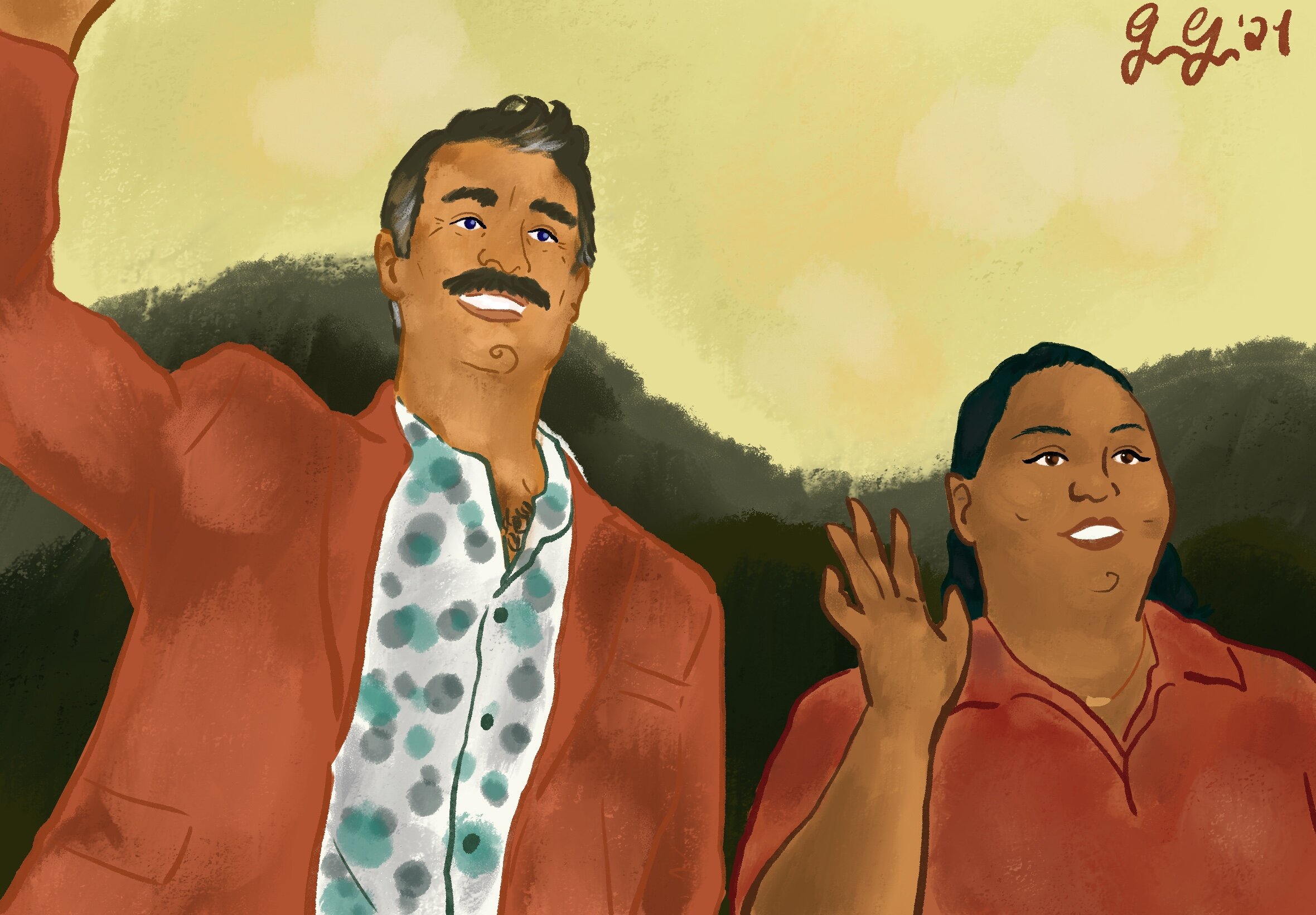Graphic by Gabby Gagnon ‘24
By Lucy Oster ’23
Staff Writer
“The White Lotus,” one of the most talked-about television shows of summer 2021, is deceptive from the onset. The series begins with a mystery, but as it unfolds it becomes clear that hot-button issues such as class struggle and race are at the center of the narrative. Although I first became interested in the HBO six-episode limited series upon viewing the opening shots, which display a dead body being loaded onto a plane, I noticed the show ends up leaning more toward satire than a sincere whodunit.
The series takes place at a resort in Hawai’i and revolves around the lives of the accommodating employees and a gaggle of guests. It is the most recent HBO series to feature rich people griping about their first-world problems, following in the footsteps of the impeccable “Succession.”
While “The White Lotus” initially includes the viewpoints of the hotel staff, thereby broadening the scope of perspective usually seen on television, I soon became aware that the show mainly ends up focusing on its wealthy white characters. Ultimately, the show works as a satire on the privileged, but left me feeling empty because it replicates the imbalance it’s attempting to critique.
Throughout “The White Lotus,” the audience hears the fun, senseless arguments of the upper class. The dialogue, which some see as the main appeal of the show, can be very funny, especially when viewers can relate to the crises of the rich. At one point, for example, one of the main characters, Mark Mossbacher (Steve Zahn), has an existential crisis on what it means to be human saying, “Like gay, straight, whatever, we’re just monkeys. We’re just fucking monkeys.” But, occasionally, I felt that the dialogue was more like a caricature of the most inane things a person could say. In one scene, Nicole Mossbacher (Connie Britton), a CFO of a tech company, turns to her teenage daughter, who is criticizing her father, and asks if she’s going to “cancel him? Dox him? Sic the K-pop stans on him?” Nicole’s use of “K-pop stans,” a term that often appears on Twitter, feels inaccurate and goofy. How would this busy corporate worker know about doxxing and the world of K-pop?
Throughout the first season, I noticed the show continues to rely on Twitter-sourced language. Olivia Mossbacher (Sydney Sweeney) and her friend Paula (Brittany O’Grady), two college-aged guests staying at the resort, can best be described as part of the so-called “dirtbag left,” neglecting the civility of liberalism. True to the culture of young internet leftists, Olivia consistently makes fun of her mother’s liberal, Clinton-esque politics. At one point, in a clear reference to American financier Jeffrey Epstein, Olivia even snarks that her parents are “high-end pimps for a billionaire sex pervert.”
I found the deluge of Twitter references entertaining but deadening because it recreates the social media echo chamber we live in without providing any substantive critique of it. The constant rehashing of Twitter discourse and the same trite talking points had me wondering if the show would add anything new to the political conversation about class differences. I hoped the outsider perspectives of the employees would jolt the “The White Lotus.” If employees’ narratives were included, the show could break out of the cycle of critiquing privilege by demonstrating privilege.
Unfortunately, the employees don’t ever receive full character arcs. We only see the employees burdened by interactions with the resort’s guests. As viewers, we witness the resort’s manager, Armond (Murray Bartlett), indulging a guest. Then, we see his subsequent annoyance once the guest turns away; however, we never access the parts of Armond’s personality where the guest does not play a role. The show’s satire revolves around the treatment of the working class, but we never truly hear their side.
Perhaps part of the reason the inner lives of the employees are so reduced is because “The White Lotus” was filmed during the pandemic. This made it so that the actors had to quarantine and shoot exclusively at the Four Seasons Resort in Maui. The show makes use of this limitation by treating the resort as its central setting, only concerning itself with the characters within its walls. When the employees leave the resort, they’re not seen again until they return. Toward the end of the first episode, one employee gives birth; she only reappears during the last episode, when she enters the resort again.
The show being filmed during the pandemic potentially excuses the fact that it bases itself around the elite guests. But how can the show criticize white Americans visiting a Hawaiian resort while inviting an entire television show cast and crew onto the island of Maui?
“The White Lotus,” despite its obvious humor, is a snake eating its own tail. The show points out the hypocrisy of rich white people arguing over their flaws and doing nothing to fix them, but the show fails by outright ignoring the perspectives of its lower-class characters. At one point, Mark Mossbacher comments: “Obviously, imperialism was bad, but it’s humanity. Welcome to history. Welcome to America.” And I can’t help but feel that the show agrees with him.

